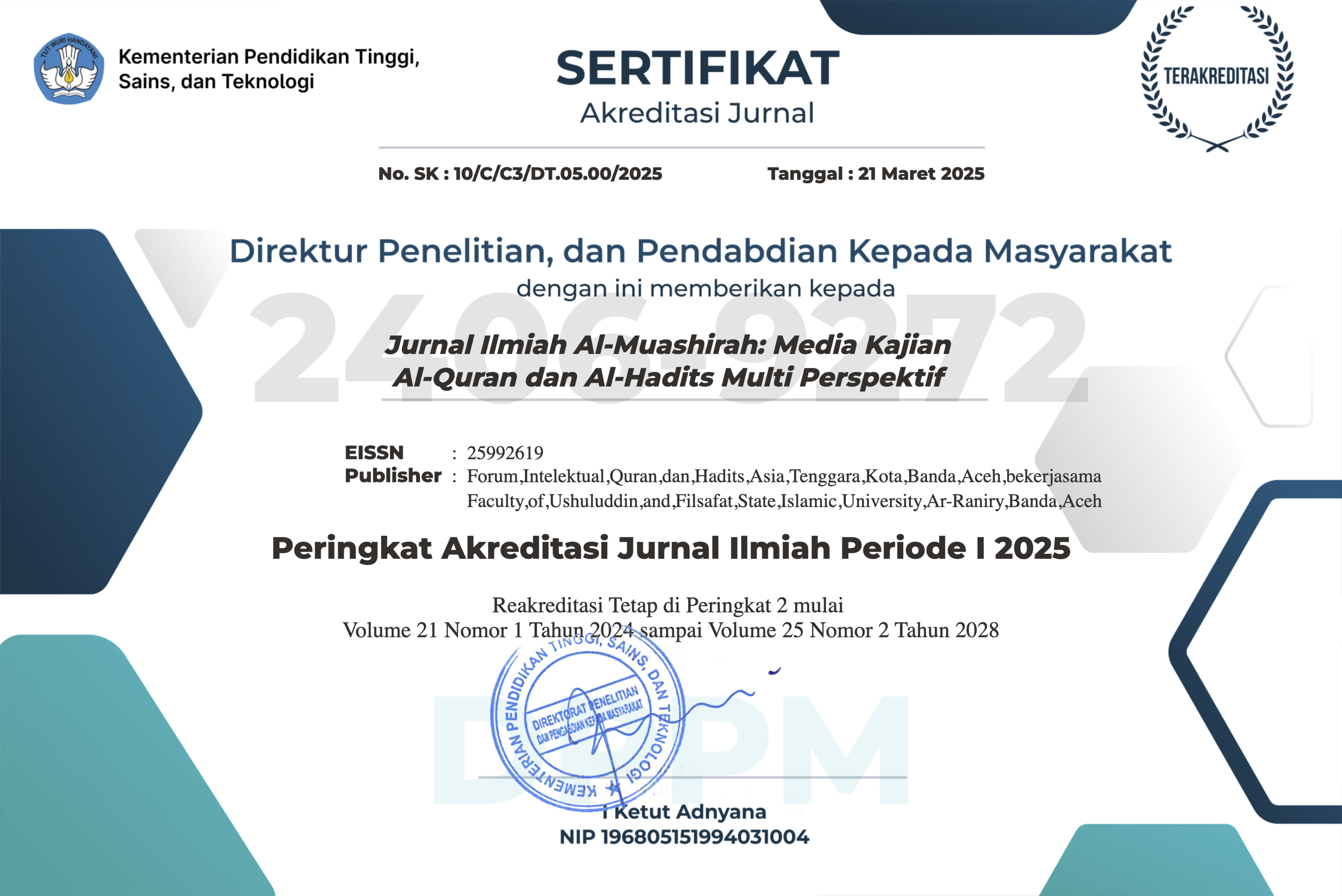Islamic Solidarity and Ta'awun: A Case Study of Community Responses to Rohingya Refugees in Sabang, Aceh
DOI:
https://doi.org/10.22373/jim.v21i2.25680Keywords:
Ta'awun, Social Solidarity, Rohingya Refugees, Community ResponseAbstract
The principle of ta'awun (mutual assistance) is a fundamental Islamic value that promotes solidarity and shared responsibility. Its practical application in contemporary, culturally diverse societies often encounters significant challenges. This study investigates how the residents of Ie Meulee Village, Sukajaya Subdistrict, Sabang City, practiced ta'awun in responding to Rohingya refugees stranded in the area during December 2023. Employing a qualitative methodology, the study collected data through observations, interviews with 14 informants—including village officials, religious leaders, community members, and refugees—and document analysis. The findings reveal varied interpretations and implementations of ta'awun, shaped by factors such as religious education, the social environment, and economic constraints. While residents with strong religious knowledge exhibited proactive assistance, others provided help spontaneously or hesitated due to existing prejudices. This study underscores the importance of inclusive religious education, community-based social programs, and local policies to foster cross-cultural solidarity, ensuring the sustainable application of ta'awun values in multiethnic societies.
Downloads
References
Abdul-Baqi, Muhammad Fu’ad, Mu`jam Al-Mufahras Li Alfaz Al-Qur’an Al-Karim (1981)
Adnan Amal, Taufiq, Rekonstrusi Sejarah Al-Qur’an (FKBA, 2001)
Al-Bushrawi, Abu al-Fida’ ‘Imaduddin Isma’il bin Umar bin Kathir al-Qurasyi, Tafsir Ibn Kathir Jilid 1, 2, 3, 5, 10, Terjemahan Arif Rahman Hakim Dkk (Insan Kamil, 2015)
Amal, T A, Rekonstruksi Sejarah Al-Quran (Pustaka Alvabet, 2013)
Amrullah, Abdul Malik Abdul Karim, Tafsir Al-Azhar, Cet. Ke-5 (Pustaka Nasional Pte. Ltd, 2003)
Anwar, Rosihon, Ulum Al-Qur’an (Pustaka Setia, 2008)
As-Suyuthi, Jalaluddin Imam, Asbabun Nuzul : Sebab-Sebab Turunnya Ayat Al-Qur’an, ed. by Ali Nurdin and Ummu Nabila Handrini (Qisthi Press, 2017)
Az-Zuhaili, Wahbah, Tafsir Al-Munir Jilid 1: Aqidah, Syariah, Manhaj (Gema Insani, 2013)
———, Tafsir Al-Munir Jilid 10: Aqidah, Syariah, Manhaj (Gema Insani, 2016)
———, Tafsir Al-Munir Jilid 15: Aqidah, Syariah, Manhaj (Gema Insani, 2016)
———, Tafsir Al-Munir Jilid 5: Aqidah, Syariah, Manhaj (Gema Insani, 2016)
———, Tafsir Al-Munir Jilid 8: Aqidah, Syariah, Manhaj (Gema Insani, 2016)
———, Tafsir Al-Munir Jilid 9: Aqidah, Syariah, Manhaj (Gema Insani, 2016)
Creswell, J.W., Research and Design Qualitative, Quantitative and Mixed Methods Approaches, Thousand Oaks California, 2018
Darnela, Lindra, ‘Islam and Humanity: Commodification of Aid for Rohingya in Aceh’, Al-Jami’ah: Journal of Islamic Studies, 59.1 (2021), pp. 57–96, doi:10.14421/ajis.2021.591.57-96
Hanafi, Muchlis M, ed., Asbābun-Nuzūl: Kronologi Dan Sebab Turun Wahyu Al-Qur’an (Lajnah Pentashihan Mushaf Al-Qur’an, Badan Litbang dan Diklat, Kementerian Agama RI, 2015)
Irwanysah, Irwansyah, and Al Asya’ari Al Asya’ari, ‘Rohingya Muslims in Indonesia: Interaction, Stigmatization and Religious Response’, FIKRAH, 10.2 (2022), p. 241, doi:10.21043/fikrah.v10i2.16287
Jordan, Rob, ‘Personal Experience and Disaster Adaptation’, Stanford Report, 2022 <https://news.stanford.edu/stories/2022/03/personal-experience-disaster-adaptation?utm_source=chatgpt.com>
Komariah, Nurul, and Ishmatun Nihayah, ‘Improving The Personality Character of Students Through Learning Islamic Religious Education’, At-Tadzkir: Islamic Education Journal, 2.1 (2023), pp. 65–77, doi:10.59373/attadzkir.v2i1.15
Madsen, Wendy, ‘People’s Past Experiences and Personal Stories Can Influence Risk-Taking Behaviour’, Australian Journal of Emergency Management, 34.3 (2019), pp. 47–51 <https://knowledge.aidr.org.au/resources/ajem-july-2019-people-s-past-experiences-and-personal-stories-can-influence-risk-taking-behaviour/?utm_source=chatgpt.com>
Miles, Matthew B, A. Michael Huberman, and Johny Saldana, Qualitative Data Analysis, A Methods Sourcebokk, ed. by Tjetjep Rohindi Rohidi, 3rd edn (UI Press, 2014)
Pratisti, Siti Aliyuna, Taufik Hidayat, and Deasy Silvya Sari, ‘When Solidarity Is Trampled by Religious Sentiment: Outlining Indonesian Muslim Solidarity toward Rohingya Refugees’, Jurnal Ilmu Sosial Dan Ilmu Politik, 23.1 (2019), p. 1, doi:10.22146/jsp.35732
Rachman, Azhariah, Akhmad Nurul Kawakip, Fadhillah Fadhillah, Nanda Saputra, and Zulkifli Zulkifli, ‘Building Religious Character of Students in Madrasah Through Moral Learning’, Tafkir: Interdisciplinary Journal of Islamic Education, 4.1 (2023), pp. 78–94, doi:10.31538/tijie.v4i1.261
Saputra, Teguh, ‘Konsep Ta’awun Dalam Al-Qur’an Sebagai Penguat Tauhid Dan Solidaritas Sosial’, Al-Mutharahah: Jurnal Penelitian Dan Kajian Sosial Keagamaan, 19.2 (2022), pp. 29–45, doi:10.46781/al-mutharahah.v19i2.517
Sarif, Suhaimi Mhd, Yusof Ismail, and Dolhadi Zainudin, ‘Empowering Responsible Consumers Through Ta’awun (Mutual Cooperation) for Sustainability’, 2024, p. Suhaimi Mhd-101, doi:10.15405/epsbs.2024.05.8
Shihab, M. Quraish, Tafsir Al-Miṣbāh (Lentera Hati, 2012)
———, Tafsir Al-Misbah (Pesan, Kesan Dan Keserasian Al-Quran, Vol. 10 (Lentera Hati, 2017)
Thaib, Suraiya Ismail, Muhammad Bin Ibrahim, Nurkhalis Muhammad Sufi, Nurlaila Abu Bakar, and Ahmad Sunawari Long, ‘SHARIA LAW AND COMMUNITY RESPONSE TO ROHINGYA REFUGEES IN ACEH’, PETITA: JURNAL KAJIAN ILMU HUKUM DAN SYARIAH, 9.2 (2024), doi:10.22373/petita.v9i2.336
Wulan, Mawar Kusuma, ‘Continuing to Arrive, President Orders Joint Handling of Rohingya Refugees - Kompas.Id’, Kompas.Id, 2023 <https://www.kompas.id/baca/english/2023/12/04/en-presiden-perintahkan-penanganan-bersama-pengungsi-rohingya>
Yunanda, Rizki, Teuku Kemal Fasya, Dedi Fariadi, Kurniawati Kurniawati, Dini Rizki, and Faizul Aulia, ‘The Social Impact of the Existence of Rohingya Refugees in Aceh’, Community : Pengawas Dinamika Sosial, 10.1 (2024), p. 129, doi:10.35308/jcpds.v10i1.9009
Downloads
Published
Issue
Section
License
Authors who publish in Jurnal Ilmiah Al-Mu'ashirah agree to the following terms:
- Authors retain copyright and grant the journal right of first publication with the work simultaneously licensed under a Attribution-ShareAlike 4.0 International (CC BY-SA 4.0) License that allows others to share the work with an acknowledgment of the work's authorship and initial publication in this journal.
- Authors are able to enter into separate, additional contractual arrangements for the non-exclusive distribution of the journal's published version of the work (e.g., post it to an institutional repository or publish it in a book), with an acknowledgment of its initial publication in this journal.
- Authors are permitted and encouraged to post their work online (e.g., in institutional repositories or on their website) prior to and during the submission process, as it can lead to productive exchanges, as well as earlier and greater citation of published work (See The Effect of Open Access).













